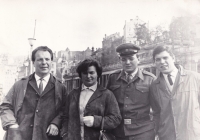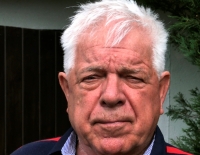I cried because the Czechs were beating the Czechs

Download image
Ivan Stehlík was born on 13 June 1946 in Prague into a family that lived for sport. He excelled in tennis, but later his lifelong love, hockey, won out. He devoted himself to it, whether as a player or as a coach, all his life. He became a first league player and hockey allowed him to travel abroad as a Czechoslovakian representative. After the compulsory military service, which he served in Dukla Košice, he became a player of Kometa Brno. He was not particularly interested in politics, yet he became one of the prominent figures in the 1969 protests against the occupation in Brno. Without taking part in the demonstrations, militiamen sought him out, arrested him and beat him and his friend for no reason. A photograph of his beaten body made its way even onto the pages of the German magazine Stern. From 1971 he played for Slavia Prague, then in Uhelné sklady Prague and spent five years in Benátky nad Jizerou, later also as a coach. He retired from active hockey in 1989. In 2021 he lived in Hostouň.











